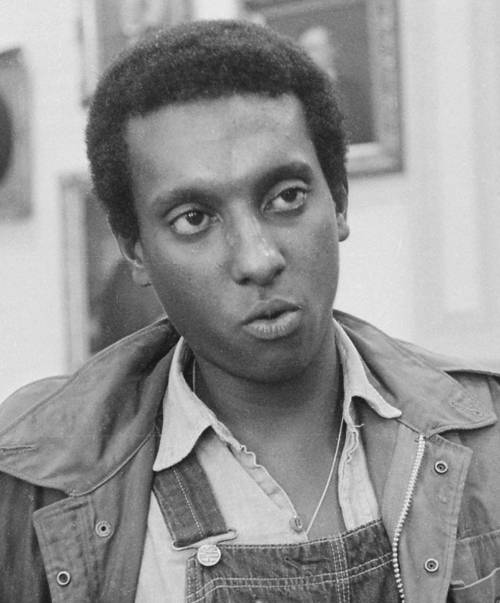
FAQ About Stokely Carmichael

Who was Stokely Carmichael?
Stokely Carmichael was a prominent civil rights activist known for his leadership in the Black Power movement during the 1960s. He played a significant role in advocating for African-American empowerment and was influential in shifting the civil rights movement toward a more militant and self-reliant approach.

What is Stokely Carmichael famous for?
Stokely Carmichael is famous for his role in the Black Power movement and for popularizing the term "Black Power" as a rallying cry for African-Americans in the 1960s. His work and speeches emphasized racial pride, economic empowerment, and the creation of black political and cultural institutions.

What organizations was Stokely Carmichael associated with?
Stokely Carmichael was associated with several organizations throughout his career, most notably the Student Nonviolent Coordinating Committee (SNCC), where he served as chairman. He was also involved with the Black Panther Party, helping to shape its focus on Black Power and community self-defense.

How did Stokely Carmichael impact the civil rights movement?
Stokely Carmichael impacted the civil rights movement by introducing more radical ideas and strategies through his promotion of Black Power, encouraging a shift from integration-focused methods to one of self-reliance and community empowerment. His ideas contributed to the development of the Black Panther Party and other movements that aimed for black autonomy.

What was Stokely Carmichael’s role in the Black Panther Party?
Stokely Carmichael served as the honorary prime minister of the Black Panther Party. In this role, he influenced the party's ideology and rhetoric, encouraging a focus on Black Power, self-defense, and community programs to aid African-Americans.

Did Stokely Carmichael write any books?
Yes, Stokely Carmichael wrote several books. One of his most notable works is "Black Power: The Politics of Liberation," co-authored with Charles V. Hamilton. The book is considered a significant text in understanding the ideology and goals of the Black Power movement.

Why did Stokely Carmichael change his name to Kwame Ture?
Stokely Carmichael changed his name to Kwame Ture as a reflection of his commitment to Pan-Africanism. The name was an homage to two African leaders he admired: Kwame Nkrumah of Ghana and Sekou Toure of Guinea. The change symbolized his dedication to African solidarity and cultural identity.

What was the significance of Stokely Carmichael’s "Black Power" speech?
The "Black Power" speech, delivered in 1966 during the Meredith March Against Fear, was significant because it marked a turning point in the civil rights movement. It galvanized a shift from the traditional nonviolent civil disobedience approach to a more assertive stance on racial pride and self-determination for African-Americans.

How did Stokely Carmichael’s views differ from Martin Luther King Jr.?
Stokely Carmichael's views differed from those of Martin Luther King Jr. in that Carmichael advocated for a more militant and self-sufficient approach to achieving racial equality. While King focused on nonviolent resistance and integration, Carmichael emphasized black nationalism and empowerment, believing systemic change required more assertive tactics.

What influenced Stokely Carmichael’s activism?
Stokely Carmichael was influenced by a variety of factors, including his early life experiences with racial discrimination and his education at Howard University. Influential figures such as Malcolm X and international movements for decolonization also played a role in shaping his views on racial equality and self-determination.

What is the legacy of Stokely Carmichael?
The legacy of Stokely Carmichael lies in his profound impact on the civil rights and Black Power movements. His advocacy for black pride, economic empowerment, and political autonomy helped inspire future generations of activists. His work remains influential in discussions around racial equality and social justice.

Was Stokely Carmichael involved in any international movements?
Yes, Stokely Carmichael was involved in international movements, particularly those related to Pan-Africanism. He spent time in Africa advocating for unity among African nations and spoke against colonialism and imperialism. His work in Guinea with President Sekou Toure further emphasized this commitment.

What was Stokely Carmichael’s relationship with SNCC?
Stokely Carmichael had a significant relationship with the Student Nonviolent Coordinating Committee (SNCC), serving as its chairman in the mid-1960s. Under his leadership, SNCC shifted towards a more radical, Black Power-oriented approach, influencing other civil rights organizations and movements.

Did Stokely Carmichael participate in any significant marches or protests?
Stokely Carmichael participated in numerous significant marches and protests, including the Freedom Rides, the March on Washington in 1963, and the Meredith March Against Fear in 1966, where he famously delivered the "Black Power" speech.

How did Stokely Carmichael’s rhetoric influence future movements?
Stokely Carmichael’s rhetoric around self-reliance and black nationalism influenced future movements by laying the groundwork for ideas that would drive organizations like the Black Panther Party. His emphasis on community building and empowerment resonated with later activists seeking systemic change.

Where did Stokely Carmichael receive his education?
Stokely Carmichael received his education at Howard University, one of the most prestigious historically black colleges in the United States. His time there was instrumental in shaping his activism, exposing him to radical ideas and influential peers.

What role did Stokely Carmichael play in the Freedom Rides?
Stokely Carmichael played a crucial role in the Freedom Rides as one of the many young activists who challenged segregation in interstate bus travel. He was arrested multiple times during these rides, demonstrating his commitment to nonviolent protest and civil disobedience.

How did Stokely Carmichael’s views evolve throughout his life?
Throughout his life, Stokely Carmichael's views evolved from advocating for nonviolent resistance to embracing a more radical, revolutionary approach to racial justice, emphasizing black nationalism and Pan-Africanism. His later years focused more on international issues and African unity.

When and where was Stokely Carmichael born?
Stokely Carmichael was born on June 29, 1941, in Port of Spain, Trinidad and Tobago. He moved to the United States at a young age and grew up in the Bronx, New York, where he began his journey into activism.

When did Stokely Carmichael pass away?
Stokely Carmichael passed away on November 15, 1998, in Conakry, Guinea. At the time of his death, he had been living in Africa for several years, continuing his advocacy for Pan-Africanism and African unity.
